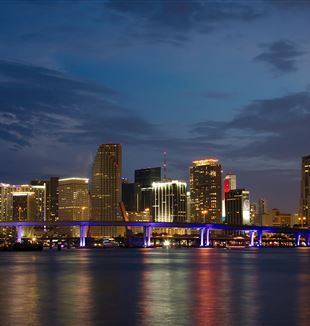
Success Is the Top. Life Is More
The first public gesture of the Miami community. A round table on The Religious Sense with a very provoking title. Speakers were Msgr. Albacete, David Horowitz, and Brother Richard DeMaria, Superintendent of Catholic Schools for Miami.This time The Religious Sense arrived in Miami, Florida, the farthest southeastern point of the United States, amid white beaches, blue sea, coconut palms, pelicans, and alligators.
It arrived there because a little group of five friends wanted to make it known badly enough to succeed in setting up a public gesture at one of the most prestigious local universities, St. Thomas University. This was the first public gesture of this tiny community. Once again, the greatest surprise was seeing how many doors were flung open upon request.
From the encouragement of the Auxiliary Bishop, Thomas Gerard Wenski, to the welcome received from Fr. Blackwell at St. Thomas, to the availability and friendship shown by Brother Richard DeMaria, everything–as always–came gratuitously and unexpectedly.
For days beforehand, Fr. Chris Marino invited everybody he knew to the presentation, and Lucia, Willy, and Carmen stayed up to the wee hours more than one night to prepare a mailing list.
When April 4th arrived, the Hall of Fame was packed with a curious and attentive audience.
At the speakers’ table, with Fr. Chris moderating as host, were Brother Richard DeMaria, Superintendent of Miami Catholic Schools, and two old friends from New York, David Horowitz and Msgr. Lorenzo Albacete.
The title chosen for the event was a bit unusual: “Success is the Top. Life is More: a conversation on The Religious Sense by Luigi Giussani.”
Why this title? Because Giussani’s proposal has to do with life; indeed, it strikes the very heart of human experience. What is the measure, what gives a face to our “I”?
Msgr. Albacete immediately swept the field clean of any possible misunderstanding by bringing into focus what man is–reason and affection, desire for fulfillment, infinite thirst for happiness–and launched Fr. Giussani’s message as a path to the truth.
The journey along this path cannot be taken alone, but it leads to the threshold of the great Fact, the event of Jesus present in our midst. The journey is made up of encounters and experiences, free of any psychology, fundamentalism, or sentimentalism.
The witness given by Horowitz was moving. The great musician told how the encounter with the writings of Giussani and “his friends” made him discover the profound value of his daily work. He had intuited its value, but had not succeeded in articulating it or understanding it. “Giussani is teaching me,” Horowitz concluded, “to be attentive to the beautiful and true that I encounter in the course of my days.”
The third speaker was Brother Richard DeMaria, Superintendent of Catholic Schools for the Archdiocese of Miami, a learned man with a great love for teaching and for relating with youth. “Human experience raises questions,” he stated, “and a true teacher is one who draws these questions out. It is then a matter of verifying over time, ‘watching yourself in action’ and ‘in light of your own experience,’ what has come to you as a proposal.” Talking about his own work, Brother DeMaria concluded by saying that “communion is the greatest instrument of evangelization. In American history, this striving for community has always played a primary role. But the problem area is the dynamics of affection.”
The audience then took the floor, provoking the three speakers to go more deeply into what they had said.
The evening drew to an end around the book table, where Giussani’s books and the Spirto Gentil compact discs sold briskly. “This work Giussani is doing with music is fascinating to me. I too have always urged the kids to listen together and with a guide, to watch movies, to read poetry. If it’s not like this, it is not experience.”